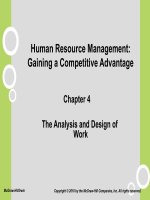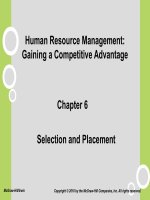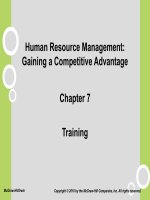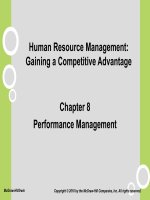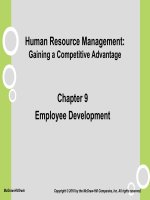HRM gaining a competitive advantage chapter 004 3rd ed
Bạn đang xem bản rút gọn của tài liệu. Xem và tải ngay bản đầy đủ của tài liệu tại đây (341.62 KB, 18 trang )
4
Chapter
The Analysis and
Design
of
Work
Objectives
• Analyzing a work-flow process, identifying the
output, activities, and inputs in the production
of a product or service.
• Understand the importance of job analysis in
strategic and human resource management.
• Choose the right job analysis technique for a
variety of human resources activities.
• Identify the tasks performed and the skills
required in a given job.
• Understand the different approaches to job
design.
• Comprehend the trade-offs among the various
approaches to designing jobs.
Irwin/McGraw-Hill
© The McGraw-Hill Companies,
4-2
Developing a Work-Unit Analysis
Inputs
- material
information
Equipment
- facilities
- systems
ACTIVITY
what tasks
are required ?
OUTPUT
- product/service
- how measured?
People
- knowledge
- skills
- abilities
Irwin/McGraw-Hill
© The McGraw-Hill Companies,
Organizational Structure
4-3
•Provides a cross-sectional overview of the static
relationships between individuals and units that
create the outputs.
•Typically, displayed via organizational chart
Irwin/McGraw-Hill
© The McGraw-Hill Companies,
Dimensions of Structure
4-4
Centralization
Decentralization
Decision making
authority at the top
of the organizational
chart.
Decision making
authority distributed
throughout the lower
levels.
Irwin/McGraw-Hill
© The McGraw-Hill Companies,
Structural Configurations
4-5
Two common configurations of organizational
structure are:
Functional
Divisional
Products
Geography
Clients
Irwin/McGraw-Hill
© The McGraw-Hill Companies,
4-6
The Importance of Job Analysis
to HR Managers
Career Planning
Work Redesign
Job Evaluation
HR Planning
Job
Analysis
Training and
Development
Recruitment
Selection
Irwin/McGraw-Hill
Performance Appraisal
© The McGraw-Hill Companies,
4-7
The Importance of Job Analysis
to Line Managers
Understand work-flow
work-flow
Understand
Job
Analysis
Information
Irwin/McGraw-Hill
© The McGraw-Hill Companies,
4-8
The Importance of Job Analysis
to Line Managers
Understand work-flow
work-flow
Understand
Job
Analysis
Information
Irwin/McGraw-Hill
Make correct
correct
Make
hiring decisions
decisions
hiring
© The McGraw-Hill Companies,
4-9
The Importance of Job Analysis
to Line Managers
Understand work-flow
work-flow
Understand
Job
Analysis
Information
Make correct
correct
Make
hiring decisions
decisions
hiring
Evaluate performance
performance
Evaluate
Irwin/McGraw-Hill
© The McGraw-Hill Companies,
Nature of Information
4-10
Job DescriptionDescription a list of tasks, duties, and
responsibilities (TDR’s)
Job SpecificationSpecification a list of knowledge, skills,
abilities, and other characteristics
(KSAO’s)
Irwin/McGraw-Hill
© The McGraw-Hill Companies,
4-11
Title: Maintenance Mechanic
Sample Job Description
General Description of Job Duties: General maintenance and
repair of
all equipment used in a particular district.
1. Essential Duty (40%) : Maintenance of Equipment
Tasks: Keep a log of all maintenance performed on equipment.
Replace parts and fluids according to maintenance schedule. - -
2. Essential Duty (40%): Repair of Equipment
Tasks: Requires inspection of equipment and a recommendation
that a piece be scrapped or repaired. If equipment is repaired - 3. Essential Duty (10%): Testing and Approval
Tasks: Ensure that all required maintenance and repair has been
done according to manufacturer specs. - 4. Essential Duty(10%): Maintain Stock
Tasks: Maintain inventory of parts needed for maintenance and
repair of equipment. Responsible for ordering parts at lowest cost.
-Irwin/McGraw-Hill
Nonessential
© The McGraw-Hill Companies,
Functions: Other duties as assigned.
Job Analysis Methods
4-12
Irwin/McGraw-Hill
Task Analysis Inventory
Position Analysis Questionnaire (PAQ)
Fleishman Job Analysis System
© The McGraw-Hill Companies,
4-13
Identifying Job Dimensions and Job
tasks for a University Professor
Teaching
Research
(“Prepares
(“Prepares
and presents research reports
lecture material for publication
to class.”)
in journals.”)
Advising
(“Gives career
counseling advice
to students.”)
Consulting
Service
(“Serves on
departmental
committees as
needed.”)
(“Performs
work for external
organizations.”)
Irwin/McGraw-Hill
© The McGraw-Hill Companies,
Job Characteristic Model
4-14
Core Job
Dimensions
Skill Variety
Task Identity
Task Significance
Autonomy
Feedback
Irwin/McGraw-Hill
© The McGraw-Hill Companies,
4-15
Job Characteristic Model
Core Job
Dimensions
Skill Variety
Task Identity
Task Significance
Psychological States
Meaningful Work
Autonomy
Responsibility
for outcome
Feedback
Knowledge of results
Irwin/McGraw-Hill
© The McGraw-Hill Companies,
Job Characteristic Model
4-16
Psychological States
Work Outcomes
High Motivation
Meaningful Work
High Quality Work
Responsibility
for outcome
High Satisfaction
Knowledge of results
Low Absenteeism
and Turnover
Irwin/McGraw-Hill
© The McGraw-Hill Companies,
4-17
Summary of Job Design Approaches
Job Design Approach Satisfaction Dimension
Motivational
Mechanistic
job satisfaction
motivation
job involvement
chance of stress
job satisfaction
motivation
Performance Dimension
job performance
absenteeism
training time
chance of error
chance of stress
use levels
training time
chance of error
use levels
absenteeism
Legend:
Irwin/McGraw-Hill
= positive
= negative
© The McGraw-Hill Companies,
4-18
Summary of Job Design Approaches
Job Design Approach
Biological
Satisfaction Dimension
Performance Dimension
job satisfaction
physical effort
fatigue
absenteeism
medical incidents
financial costs
Perceptual
/motor
Irwin/McGraw-Hill
Legend:
chance of stress
training time
chance of error
use levels
job satisfaction
motivation
= positive
= negative
© The McGraw-Hill Companies,



